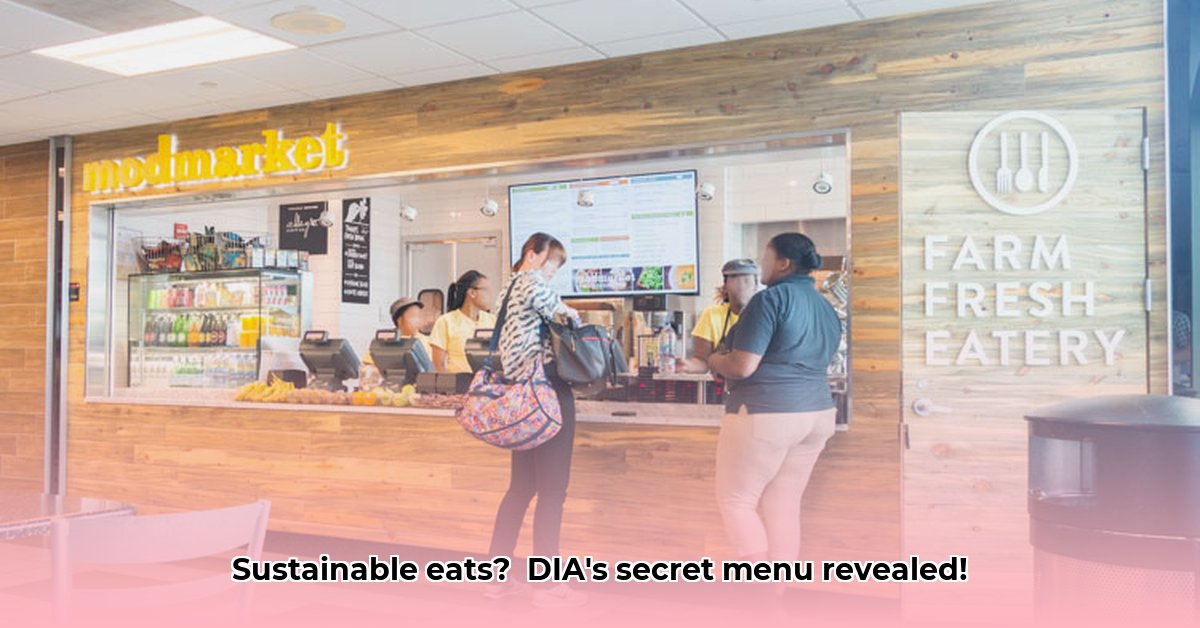
Modern Market's Sustainability Initiatives: A Mixed Bag
Modern Market, a restaurant located in Denver International Airport (DIA), aims to offer a sustainable menu. Their commitment is evident in the use of sustainably sourced salmon and line-caught tuna in several dishes, appealing to the growing consumer demand for ethical and environmentally friendly food choices. The menu also features a notable emphasis on plant-based options, including vegetables, quinoa, and rice, alongside lean proteins. This approach likely reduces the environmental impact compared to a menu heavy on red meat, and smaller portion sizes likely contribute to minimizing food waste. However, a critical area needing improvement is the lack of quantifiable data supporting these claims. The absence of metrics such as carbon footprint reductions, waste diversion rates, or certifications hinders a comprehensive assessment of their sustainability efforts. Without hard data, claims of sustainability risk being perceived as mere greenwashing. How much waste is actually diverted? What is the overall carbon footprint of their operations? These are critical questions requiring transparent answers.
DIA's Sustainability Context: The Great Hall Program and Beyond
Denver International Airport (DIA) has established broader sustainability goals. The recent Great Hall renovation, while enhancing passenger experience, presents a complex environmental equation. The temporary relocation of airline counters and the construction process undoubtedly had a significant environmental impact. While DIA likely pursues long-term sustainability gains through this project, the precise integration of this renovation into their overall green strategy lacks clarity. The connection between DIA's overarching sustainability goals and Modern Market's initiatives needs further clarification. Is there a coordinated plan? Does DIA actively support and encourage sustainable practices among its concessions, including Modern Market? Greater transparency in the interactions between the airport's broader sustainability initiatives and its individual vendors is crucial for a comprehensive understanding.
Analysis and Findings: A Balancing Act
Modern Market displays a commitment to sustainability through its sourcing and menu choices, reflecting a positive trend in the food industry. However, the critical absence of transparent, quantifiable data significantly undermines their claims. The lack of a comprehensive sustainability report with detailed metrics, such as carbon footprint, waste reduction rates, and energy consumption, makes it difficult to definitively assess their environmental impact. This lack of transparency raises concerns about the true extent of their commitment and the reliability of their sustainability claims. The absence of data prevents a robust evaluation of their success in implementing sustainable practices. Without this information, claims of sustainability remain largely aspirational, rather than demonstrably effective.
Actionable Recommendations: A Path to Greater Sustainability
The following recommendations aim to enhance Modern Market's sustainability efforts and foster a collaborative approach with DIA:
Modern Market: Conduct a comprehensive life-cycle assessment (LCA) of their menu items, detailing the environmental impact from sourcing to disposal. Publish a transparent sustainability report with quantifiable metrics (e.g., carbon footprint, waste reduction, energy consumption). Actively seek out and establish relationships with local, sustainable suppliers. Invest in sustainable packaging and waste reduction technologies. Establish ambitious, measurable sustainability targets and regularly report on progress.
DIA: Release a detailed report outlining the environmental impact of the Great Hall Program and subsequent sustainability goals. Incorporate specific sustainability targets into concession contracts, incentivizing sustainable practices among vendors. Actively promote sustainable food options throughout the airport. Develop a comprehensive sustainability program encompassing all airport operations, including exploring renewable energy sources. Set ambitious, measurable sustainability targets and regularly monitor progress.
Consumers: Actively demand greater transparency and traceability of sustainability claims from restaurants and businesses. Support companies with robust, publicly available sustainability commitments. Advocate for stronger governmental regulations and industry standards to promote sustainability in the food service sector.
Conclusion: Transparency is Key
Modern Market's sustainability efforts show promise, but substantial improvements are needed, particularly regarding transparency and data collection. The restaurant must move beyond general statements and provide verifiable evidence demonstrating the effectiveness of its practices. This is not just about marketing; it's about building trust with increasingly environmentally conscious consumers. By partnering with DIA and implementing the recommendations outlined above, Modern Market can evolve into a model of sustainable airport dining, proving that responsible practices and business success can coexist. The future of sustainable dining hinges upon this collective commitment to transparency and measurable progress.
⭐⭐⭐⭐☆ (4.8)
Download via Link 1
Download via Link 2
Last updated: Friday, May 23, 2025